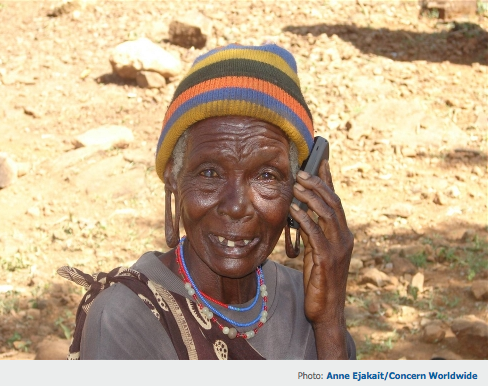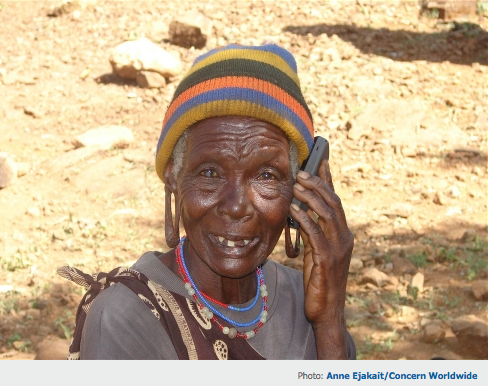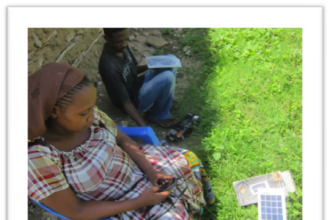
(Editor’s note: Mobile Health Around the Globe has 2 parts this week. Please read this great article first and then listen to the video of Alain Labrique who takes this argument and gives his perspective on it.)

(Editor’s note: Mobile Health Around the Globe has 2 parts this week. Please read this great article first and then listen to the video of Alain Labrique who takes this argument and gives his perspective on it.)
NAIROBI, 8 May 2013 (IRIN) – We’ve read the stories: From bedridden patients sending text messages to their health workers, to young people receiving HIV prevention messages via SMS, the mobile phone seems to have morphed from communications device to essential life-saver. But is the evidence there yet that mHealth is an effective and suitable health delivery intervention in the developing world?
IRIN, like others, has been reporting for years on mHealth’s potential: This communication technology could provide the answer to distant and under-resourced health services, in particular for Africa’s poor. Kenyan health workers have recounted how mobile phones have made it easier to track their patients’ progress; there have been anecdotal reports of lower maternal mortality rates as a result of Ghanaian mothers being able to call for ambulances during labour.
In Africa, with some 63 mobile phones per 100 inhabitants (compared to Asia and the Pacific’s 89 per 100 inhabitants), the cell in your pocket can become a direct channel for receiving public health messages, improving communication between patients and health providers, boosting data collection and, increasingly, assisting in diagnosis.
But a systematic review – published in January in PLOS Medicine – into the effectiveness of mHealth technology in improving health delivery found mixed results from 42 trials of mHealth interventions. SMS appointment reminders, for example, were found to have modest programmatic benefits, while using phones to send digital images for diagnosis actually led to a drop in the correct analysis in two trials examined.
A 2012 study by the mHealth Alliance, which advocates the use of mobile technologies in health care, found that sub-Saharan Africa had a higher number of mHealth projects compared to Asia and Latin America, with more than half of all mHealth projects related to communicable diseases such as HIV and malaria.
Insufficient evidence
Despite the rapid growth, “there is currently a gap in terms of evidence linking mHealth to improved health and operational benefits, and this is particularly true when it comes to studies in low- and middle-income countries,” Patricia Mechael, executive director of the mHealth Alliance, told IRIN.
The PLOS review found that “none of the trials were of high quality – many had methodological problems likely to affect the accuracy of their findings – and nearly all were undertaken in high-income countries.”
Rajesh Vedanthan, an assistant professor at New York’s Mount Sinai Medical Centre who is currently working with AMPATH, an academic health programme involved in research and health care in Kenya, told IRIN via email that some of the practical challenges with the use of mHealth technology included “optimizing the user interface, ensuring that users have an easy and error-free working experience with the mHealth device, not impeding the workflow of clinicians, issues related to network connectivity, access to a central server, coordination of individual devices with a central coordinating office, systems integration, etc…
“mHealth has the potential to assist with several aspects of the ‘supply chain’ of care for non-communicable diseases – including screening/diagnosis, linkage to care, treatment/decision support, retention and follow-up, systems coordination, etc.,” he added. “Whether mHealth will be effective in all of those arenas is still not robustly known, and rigorous research is still required.”
A need for standards
The mushrooming of mHealth pilot projects has caused concern around monitoring. Uganda has declared a moratorium on pilot mHealth initiatives as it seeks to bring them in line with national health policies.
“We first needed to study them [mHealth and mHealth initiatives]… Some of these people are duplicating what is already there,” Asuman Lukwago, the permanent secretary in Uganda’s Ministry of Health, told IRIN. “As a ministry, we only implement innovations that have been tested and approved. At the moment, we are suggesting reforms to put into practice for these new innovations.”
The mHealth Alliance recently released a review of standards in the use of mHealth among low- and middle-income countries, which found that as mobile health systems “move towards scale, existing guidelines and strategies will need to be revised to reflect new demands on executive sponsorship; national leadership of eHealth programmes; eHealth standards adoption and implementation; development of eHealth capability and capacity; eHealth financing and performance management and eHealth planning and architecture maintenance”.
Scaling up mHealth
Mechael noted that mHealth could only meet its potential if it was fully integrated into general health programmes, becoming “so much a part of health systems that we no longer need to use ‘m’ as a designation”, something that cannot happen unless mHealth projects move beyond the pilot phase and really reach scale at a national or regional level.
Importantly, experts say, the use of mHealth and other humanitarian technology should be allowed to be driven by the communities who benefit from it.
“There has been a recognition – belatedly, in some cases – of the ways beneficiaries are using technology, voting with their wallets and their feet… We can see that the most innovative models of humanitarian technology are driven by communities themselves,” Imogen Wall, the coordinator of communications with affected communities for the UN Office for the Coordination of Humanitarian Affairs, told IRIN.
She noted that humanitarian agencies would increasingly need to increase their engagement with the private sector as partners in preparedness and response, recognizing that the private sector is no longer merely a support system, but a humanitarian service provider as well.
OCHA recently released a report, Humanitarianism in the Network Age, which stresses the importance of information and communication in humanitarian work and urges new ways of thinking that adapt to the changing realities of communities around the world.
“In order for humanitarian technology to meet its full potential, there must be a willingness – an openness – to innovate, to think outside the box, to test new ideas and to risk failure and success in both the processes and the deliverables – essentially, a willingness to accept change,” Wall said.
To read other posts in this exclusive ongoing series, please visit the Mobile Health Around the Globe main page. And if you have a Mobile Health Around the Globe story to tell, please post a comment below or email me at joan@socialmediatoday.com Thanks!









